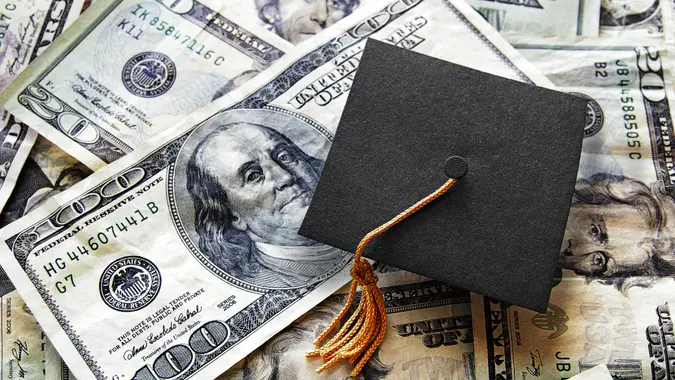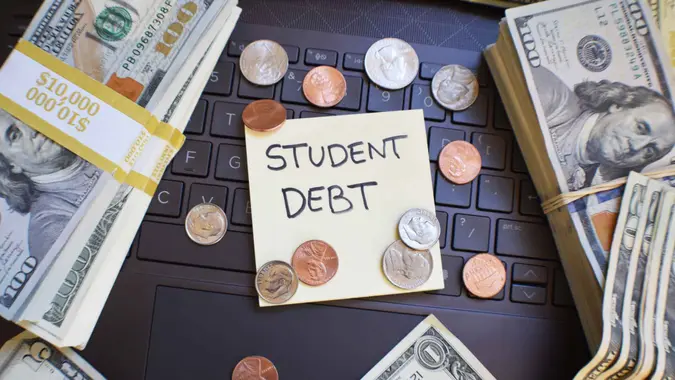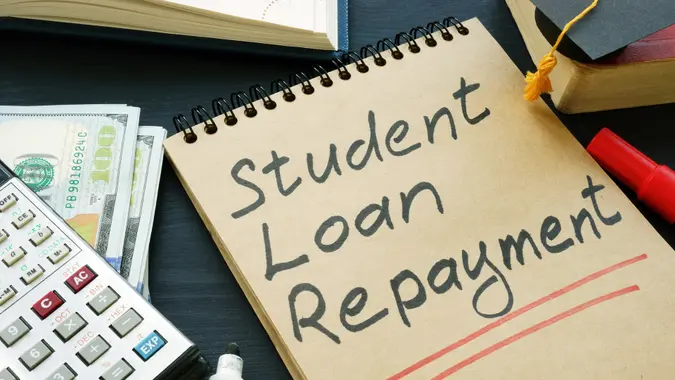I Owe 6 Figures in Student Loan Debt: 7 Things I Wish I’d Done Differently

Commitment to Our Readers
GOBankingRates' editorial team is committed to bringing you unbiased reviews and information. We use data-driven methodologies to evaluate financial products and services - our reviews and ratings are not influenced by advertisers. You can read more about our editorial guidelines and our products and services review methodology.

20 Years
Helping You Live Richer

Reviewed
by Experts

Trusted by
Millions of Readers
Meet Colleen C., a 31-year-old marketing professional who’s staring down $127,000 in student loan debt. Like many Americans, she took out loans for both her undergraduate and graduate degrees, and now she’s sharing her hard-earned wisdom.
Here’s what she wishes she’d known before signing those promissory notes.
Started at Community College
“My first two years at a private university cost me over $50,000 in loans,” Colleen said. “Looking back, I could have knocked out my general education requirements at a community college for a fraction of the cost. Those prerequisite classes count the same either way — why pay premium prices for them?”
Actually Read the Loan Terms
“I just kept clicking ‘accept’ on my loan offers without really understanding what I was signing up for,” she admitted. “I had no idea how interest capitalization worked or that my graduate PLUS loans had a 7.54% interest rate. I should have spent more time understanding the real cost of these loans.”
Worked During School
“I bought into this idea that I needed to ‘focus on my studies’ and couldn’t work,” Colleen said. “Now, I realize even a part-time campus job could have helped reduce my loan burden. Plus, work experience looks great on a resume — something I really needed after graduation.”
Applied for More Scholarships
“I applied for the big, obvious scholarships but gave up after the first few rejections,” she explained. “I wish I’d known about all these smaller, niche scholarships. There’s literally money out there for left-handed students or people who love peanut butter — I’m not kidding!”
Understood Income-Driven Repayment Earlier
“I spent six months panicking about my standard repayment amount before learning about income-driven repayment plans,” Colleen said. “I could have saved myself so much stress if I’d understood these options from the start. Now my payments are actually manageable.”
Avoided Graduate School Right Away
“I jumped straight into grad school because I wasn’t sure what else to do,” she admitted. “Two years and $58,000 in additional loans later, I wish I’d worked first to really understand if an advanced degree was necessary for my career path.”
Lived Like a Student After Graduation
“As soon as I got my first job, I upgraded my lifestyle,” Colleen said. “New apartment, new — new! Not used! — car, new wardrobe, all while my loans were in grace period. I should have kept living with roommates and driving my old car for a few more years to build up savings.”
Her Advice for Future Borrowers
“Student loans aren’t inherently bad — they helped me get an education I couldn’t otherwise afford,” Colleen explained. “But they’re serious financial commitments that deserve serious consideration. Don’t just sign up for the maximum amount because you can.”
She added, “And please, please use the loan calculators! I wish I’d calculated my future monthly payments before borrowing. Knowing that $127,000 in loans means a $1,400 monthly payment might have made me think twice about some of my choices.”
The Silver Lining
Just because Colleen has regrets, that doesn’t mean she’s not tackling her debt head-on. She’s currently exploring all her repayment options, including the Public Service Loan Forgiveness (PSLF) program.
“I’m looking into jobs at qualifying employers, like 501(c)(3) nonprofits and government agencies,” she said. “If I work full-time in public service and make 120 qualifying monthly payments, I might be eligible for forgiveness on my Federal Direct Loans.”
She added an important tip: “Anyone considering PSLF should use the PSLF Help Tool on StudentAid.gov immediately to check their eligibility. I wish I’d known earlier that not all federal loans and not all employers qualify. I’m really into this right now if you can’t tell, ha ha.”
 Written by
Written by  Edited by
Edited by 
























